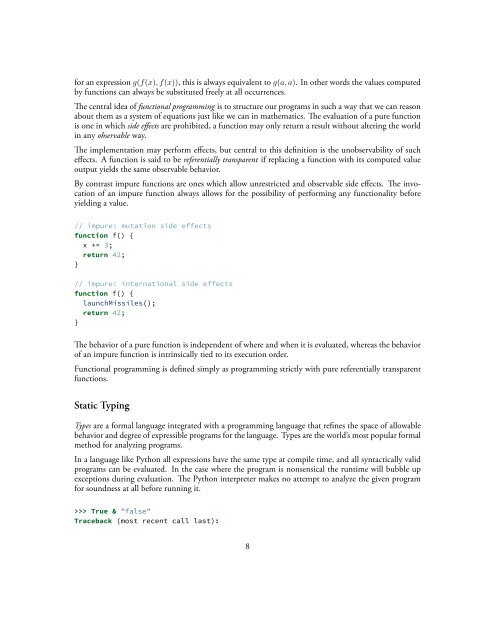Create successful ePaper yourself
Turn your PDF publications into a flip-book with our unique Google optimized e-Paper software.
for an expression g(f(x), f(x)), this is always equivalent to g(a, a). In other words the values computed<br />
by functions can always be substituted freely at all occurrences.<br />
e central idea of functional programming is to structure our programs in such a way that we can reason<br />
about them as a system of equations just like we can in mathematics. e evaluation of a pure function<br />
is one in which side effects are prohibited, a function may only return a result without altering the world<br />
in any observable way.<br />
e implementation may perform effects, but central to this definition is the unobservability of such<br />
effects. A function is said to be referentially transparent if replacing a function with its computed value<br />
output yields the same observable behavior.<br />
By contrast impure functions are ones which allow unrestricted and observable side effects. e invocation<br />
of an impure function always allows for the possibility of performing any functionality before<br />
yielding a value.<br />
// impure: mutation side effects<br />
function f() {<br />
x += 3;<br />
return 42;<br />
}<br />
// impure: international side effects<br />
function f() {<br />
launchMissiles();<br />
return 42;<br />
}<br />
e behavior of a pure function is independent of where and when it is evaluated, whereas the behavior<br />
of an impure function is intrinsically tied to its execution order.<br />
Functional programming is defined simply as programming strictly with pure referentially transparent<br />
functions.<br />
Static Typing<br />
Types are a formal language integrated with a programming language that refines the space of allowable<br />
behavior and degree of expressible programs for the language. Types are the world’s most popular formal<br />
method for analyzing programs.<br />
In a language like Python all expressions have the same type at compile time, and all syntactically valid<br />
programs can be evaluated. In the case where the program is nonsensical the runtime will bubble up<br />
exceptions during evaluation. e Python interpreter makes no attempt to analyze the given program<br />
for soundness at all before running it.<br />
>>> True & ”false”<br />
Traceback (most recent call last):<br />
8


